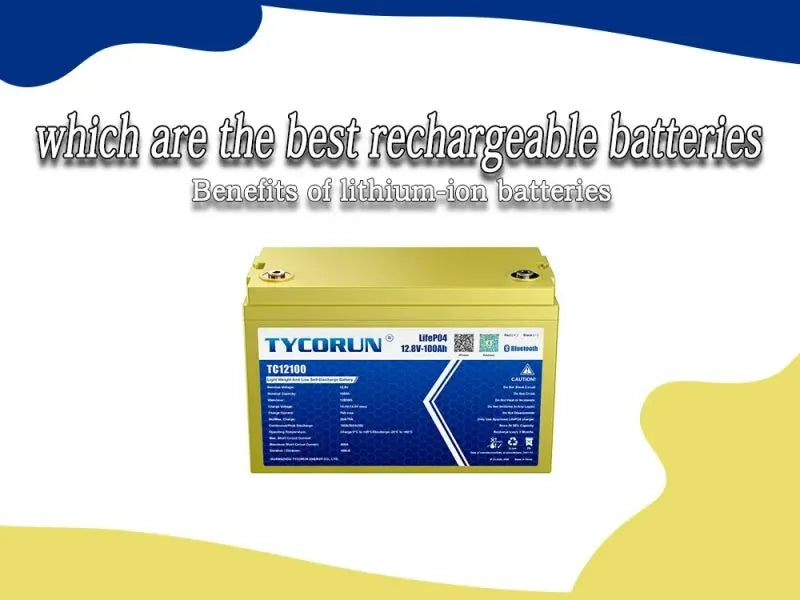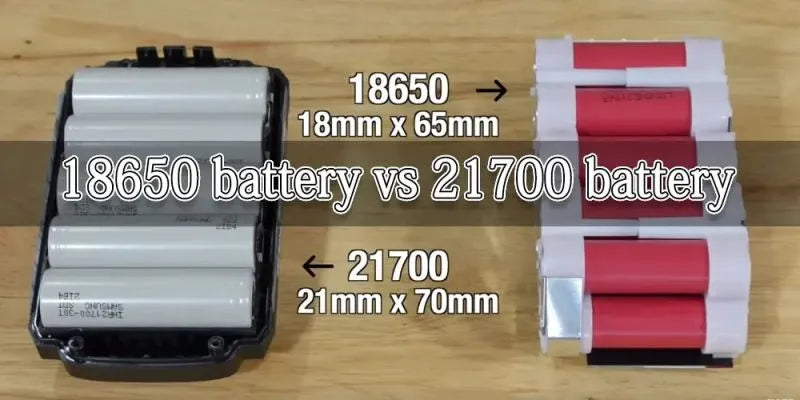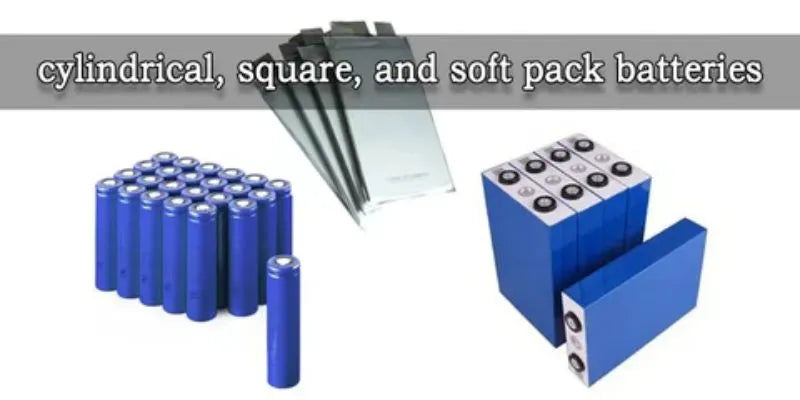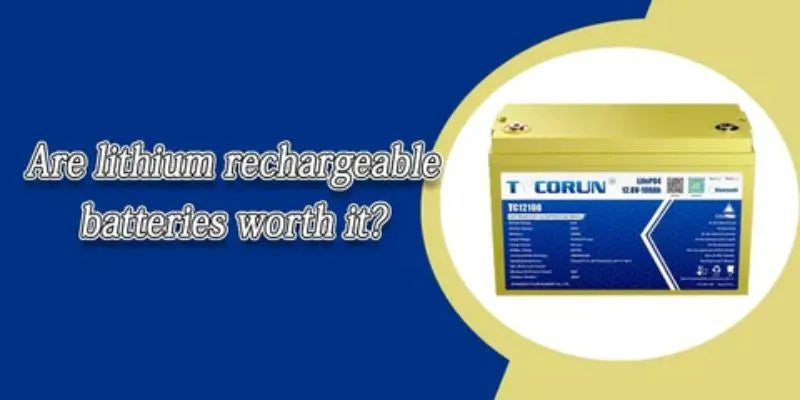
Main content:
- What are the types of batteries?
- Is it worth buying rechargeable batteries?
- Are lithium rechargeable batteries worth it?
- How do I choose a good rechargeable battery?
- What type of rechargeable battery lasts the longest
- The applications of rechargeable batteries
- Which is the best eco-friendly rechargeable battery?
- What mAh is best for rechargeable batteries?
- Does a higher mAh battery last longer?
- How do I know if my rechargeable batteries are still good?
- FAQs about best rechargeable batteries
Considering the usage of batteries in daily life, it is important to recognize their importance to know what different types of batteries occur and which are the best rechargeable batteries.
1.What are the types of batteries?
Starting with the types, the ones which are the best rechargeable batteries come in different variations regarding their sizes, shapes, and materials.
① Variance by battery size
Cylindrical batteries can be divided into AA, AAA, 18650, 21700... and so on according to size.
- AA battery vs AAA battery comparison
AA and AAA portray two different sizes of batteries. They differ apparently in their dimensions. AA appears 14.5 x 50.5 mm in size while AAA is 10.5 x 44.5 mm.
Furthermore, an AAA battery is smaller as compared to an AA battery, thus carrying less charge and being used in lower power-consuming appliances. Generally, they cannot be mixed.
Whereas, most AA and AAA batteries on the market are not rechargeable, and only lithium-ion AA/AAA batteries can be repeatedly charged and discharged.
- 18650 battery vs 21700 battery comparison

② Variance per the material used
Considering the material used, there are several batteries including;
- Lithium-ion battery
The Lithium-ion battery functions on the commutation of lithium-ions from the cathode to the anode producing energy for the battery. Vice versa, it discharges while being used as ions move back from the anode to the cathode. Common cathode materials for lithium-ion batteries are Ni, Co, Mn or iron phosphate, and carbon as a anode.
Due to their different materials and structures, lithium-ion batteries have a longer cycle life, higher energy density and lower self-discharge rate than other rechargeable batteries. It proves to be the most efficient and powerful battery considering its diversity and capabilities, putting it at the top of the list which are the best rechargeable batteries.
- Lead-acid battery
As a conventional lithium-ion battery, the lead acid battery consists of a cathode having metallic lead oxides and anode attached to the gauze of metallic lead. The electrolyte solution is sulfuric acid.
- Nickel-cadmium battery (NiCad)
The electrodes this battery are nickel-oxide and metallic cadmium with an electrolyte of potassium hydroxide.
- Nickel-metal hydride battery (NiMH)
Being identical to NiCad, NiMH also uses nickel oxide. However, the anode of the hydrogen-absorbing alloy makes it distinct.
③ Variance following the shape
Batteries come in various shapes regarding their usage and storage capacity. Listing batteries which are the best rechargeable batteries, the most commonly used include cylindrical, square, and pouch batteries.

- Cylindrical batteries have their anodes, cathodes, and separators all rolled and accumulated in a cylindrical can.
- Square batteries mostly use the lamination process. Square cells generally have a larger capacity and a higher energy density when packed into a battery pack
- Pouch batteries come in a pouch-like structure that is lightweight, customizable, and has a large charge capability.
As briefed above, rechargeable batteries come in different types and variations. For determining batteries which are the best rechargeable batteries, we need to have a comparison between them.
|
Specification |
NiCd |
NiMH |
Lead-acid |
Lithium-ion |
|
Energy (Wh/kg) |
40-60 |
30-80 |
30-40 |
300-400
|
|
Life (charges) |
1000-2000 |
500-1500 |
300-800 |
2000-4000
|
|
Charge time (hr) |
1-2 |
2-4 |
8-16 |
1-5
|
|
Self-discharge/ month |
20% |
30% |
5% |
<3.5% |
|
Nominal voltage |
1.2 V |
1.2 V |
2 V |
3.2-3.7 V |
|
Maintenance |
30-60 days lifetime when fully used |
60-90 days lifetime when fully used |
3-6 months |
Maintenance-free |
|
Efficiency |
70-90% |
70-90% |
90% |
99% |
|
Cost |
Moderate |
Moderate |
Low |
High |
Concluding the table above, lithium-ion batteries prove to be the most reliable in terms of energy, long-lasting battery, voltage, maintenance, and efficiency. This puts it among batteries which are the best rechargeable batteries.
The comparatively higher cost is not a drawback, but rather a safe investment for your appliances that help you experience the finest quality with long-term benefits. Compared with lead-acid batteries, lithium-ion batteries have three times the energy density of lead-acid batteries and are lighter. Moreover, lithium batteries do not require maintenance while lead-acid batteries require daily maintenance. In the long run, the average daily cost is actually lower for lithium-ion battery.
2.Is it worth buying rechargeable batteries?
Keeping in view both rechargeable and disposable batteries serve the identical purpose, rechargeable batteries have an upper hand. Because they can be repeatedly charged and discharged up to thousands of times. However, rechargeable batteries are also more expensive.
On the whole, despite being expensive, rechargeable batteries provide a lifetime of about 2-5 years. This indicates that they provide more energy per use and can help you save cash.
3.Are lithium rechargeable batteries worth it?

Bearing in mind a slighter higher price, is a lithium-ion battery worth paying for? Truthfully, it is. Mindful of its latest technology, it serves as a supreme alternative to any battery in comparison to its capabilities. Lithium-ion batteries have high energy density, low self-discharge and no maintenance. This makes it the leading rechargeable battery and puts it on top of those batteries which are the best rechargeable batteries.
4.How do I choose a good rechargeable battery?
Firstly, study the device you need to connect the battery to. Analyze the optimal battery requirement in mAh by their running time.
Then, find a suitable mAh battery afterward. Furthermore, the current and voltage of the device should also be matched. When considering which kind of battery to use, also think about the cycle life of the battery, average daily cost, maintenance cost, and so on.
Considering a lithium-ion battery here will improve your experience due to its unmatched performance and capability.
5.What type of rechargeable battery lasts the longest
Undoubtedly, a lithium-ion battery especially lfp battery serves to be not only the most reliable but also the most long-lasting battery.
6.The applications of rechargeable batteries
5 uses of rechargeable batteries
- Power backup
- Solar system
- Electric vehicles
- Electric appliances/ toys etc.
- Energy storage system
Lithium-ion batteries are the most commonly used battery today. These are used in power backups, solar systems, and electric cars. NiMH and NiCad are often used in electronics like headphones etc. but lithium-ion due to its reliability and long-lasting performance has replaced others in electronics as well.
7.Which is the best eco-friendly rechargeable battery?
Lithium-ion batteries are considered the most eco-friendly batteries. The reason behind this is that they consist of less toxic metals unlike lead batteries or NiCad.
As mentioned earlier, energizer lithium AA batteries are long-lasting and so are eco-friendliest as they are composed of recycled batteries. Additionally, lithium-ion batteries can be recycled, decomposed or reused after they are scrapped, which is very beneficial to environmental and energy applications.
8.What mAh is best for rechargeable batteries?
mAh varies with the capacity of the device and its usage. However, consider opting for at least a 2000 mAh battery or more to make the experience of rechargeable batteries worth it.

9.Does a higher mAh battery last longer?
The mAh of a battery depicts its capacity for storing and providing energy. More mAh means more energy storage capacity and more charges available for usage. Thus, more mAh will always last longer.
10.How do I know if my rechargeable batteries are still good?
- Battery timing of your rechargeable battery is still close to a brand new one
- It takes the same time to charge the battery as it did initially
- Use a multimeter to measure current and voltage
11.FAQs about best rechargeable batteries
① Can you overcharge a rechargeable battery?
You must avoid overcharging regularly. This may cause overheating, swelling, or leaking of a battery.
Although the batteries are charged by the manufacturer, it is still recommended to charge them before use to avoid insufficient battery power due to self-discharge.You can check the SOC of the battery before charging, if it is below 30%, then it is better to charge it before using it.
③ What is the difference between 1.2 V and 1.5 V rechargeable batteries?
Primarily, V represents the amount of energy provided by a battery to a device. 10 V means 10 volts are supplied from the battery constantly.
Talking about rechargeable batteries, the comparison comes between a 1.5 V lithium battery and a 1.2 V NiMH battery. 1.5V lithium-ion batteries have a higher voltage, so they can provide more energy, and their voltage does not drop during discharge.
Related articles: 4680 battery vs 18650, energy storage battery cell companies, 18650 battery store